关于城市生活的利弊作文
有关城市生活优缺点的英语作文
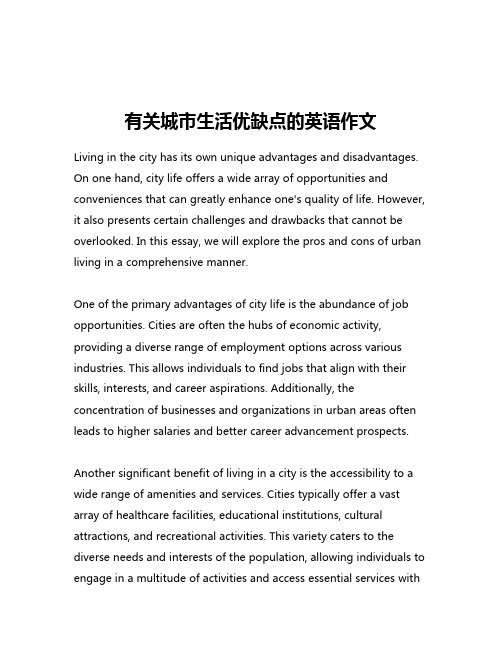
有关城市生活优缺点的英语作文Living in the city has its own unique advantages and disadvantages. On one hand, city life offers a wide array of opportunities and conveniences that can greatly enhance one's quality of life. However, it also presents certain challenges and drawbacks that cannot be overlooked. In this essay, we will explore the pros and cons of urban living in a comprehensive manner.One of the primary advantages of city life is the abundance of job opportunities. Cities are often the hubs of economic activity, providing a diverse range of employment options across various industries. This allows individuals to find jobs that align with their skills, interests, and career aspirations. Additionally, the concentration of businesses and organizations in urban areas often leads to higher salaries and better career advancement prospects.Another significant benefit of living in a city is the accessibility to a wide range of amenities and services. Cities typically offer a vast array of healthcare facilities, educational institutions, cultural attractions, and recreational activities. This variety caters to the diverse needs and interests of the population, allowing individuals to engage in a multitude of activities and access essential services withrelative ease. The availability of public transportation systems, such as buses, trains, and subways, further enhances the convenience of city living by providing efficient means of commuting and exploring the urban landscape.Furthermore, city life often fosters a sense of community and cultural diversity. Urban areas are home to people from various backgrounds, ethnicities, and socioeconomic statuses, which can lead to a rich exchange of ideas, traditions, and perspectives. This diversity can expose individuals to new experiences, broaden their horizons, and foster a greater understanding and appreciation of different cultures. Additionally, cities often host a vibrant arts and entertainment scene, offering opportunities to attend concerts, theater performances, art exhibitions, and other cultural events.However, the advantages of city life are not without their drawbacks. One of the most significant challenges is the high cost of living. Housing prices, rent, and the overall cost of goods and services are typically much higher in urban areas compared to suburban or rural regions. This can create financial strain for individuals and families, particularly those with limited incomes, and may limit their ability to afford a comfortable standard of living.Another significant downside of city life is the issue of overcrowding and congestion. The high population density in cities can lead totraffic jams, overcrowded public transportation, and a general sense of crowdedness and lack of personal space. This can result in increased stress levels, longer commute times, and a diminished sense of privacy and personal freedom.Moreover, the fast-paced and often hectic nature of city life can take a toll on one's mental and physical well-being. The constant noise, pollution, and hustle and bustle can contribute to feelings of anxiety, depression, and burnout. Additionally, the lack of access to green spaces and natural environments in urban areas can negatively impact an individual's overall well-being and connection with nature.Furthermore, the high population density in cities can also lead to challenges in terms of resource allocation and environmental sustainability. The demand for housing, transportation, and other infrastructure can put a strain on the city's resources and contribute to environmental degradation, such as air and water pollution, waste management issues, and the depletion of natural resources.In conclusion, the decision to live in a city involves carefully weighing the advantages and disadvantages. While city life offers a wealth of opportunities, conveniences, and cultural experiences, it also presents significant challenges in terms of cost of living, overcrowding, and the potential impact on mental and physical well-being. Ultimately, the choice to reside in an urban area will dependon an individual's personal preferences, priorities, and the ability to navigate the complexities of city living. Regardless of the decision, it is crucial to be aware of the trade-offs and take proactive steps to address the potential drawbacks of urban living.。
雅思写作范文之利弊类

雅思写作范文之利弊类常常阅读雅思写作范文,对雅思写作考试是很有帮助的,今天小编给大家整理了雅思写作范文之利弊类,帮助大家更好的备考雅思写作考试,一起来看看吧!雅思写作大作文范文:城市生活的利弊More and more people are migrating to cities in search of a better life, but city life can be extremely difficult. Explain some of the difficulties of living in a city. How can governments make urban life better for everyone?范文:Cities are often seen as places of opportunity, but there are also some major drawbacks of living in a large metropolis. In my opinion, governments could do much more to improve city life for the average inhabitant.The main problem for anyone who hopes to migrate to a large city is that the cost of living is likely to be much higher than it is in a small town or village. Inhabitants of cities have to pay higher prices for housing, transport, and even food. Another issue is that urban areas tend to suffer from social problems such as high crime and poverty rates in comparison with rural areas. Furthermore, the air quality in cities is often poor, due to pollution from traffic, and the streets and public transport systems are usually overcrowded. As a result, city life can be unhealthy and stressful.However, there are various steps that governments could take to tackle these problems. Firstly, they could invest money in the building of affordable or social housing to reduce the cost of living. Secondly, politicians have the power to ban vehicles from city centres and promote the use of cleaner public transport,which would help to reduce both air pollution and traffic congestion. In London, for example, the introduction of a congestion charge for drivers has helped to curb the traffic problem. A third option would be to develop provincial towns and rural areas, by moving industry and jobs to those regions, in order to reduce the pressure on major cities.In conclusion, governments could certainly implement a range of measures to enhance the quality of life for all city residents.雅思写作谈谈科技发展的利弊题目:people today can perform the everyday tasks as shopping, banking or even business transactions, without meeting others face-to face. What effects will this phenomenon have on individuals and society as a whole?分析:题目的大意是指,如今人们购物、银行甚至商业交易都可以通过网络进行,而不需要面对面的交流。
城市生活的好处和坏处的英语作文
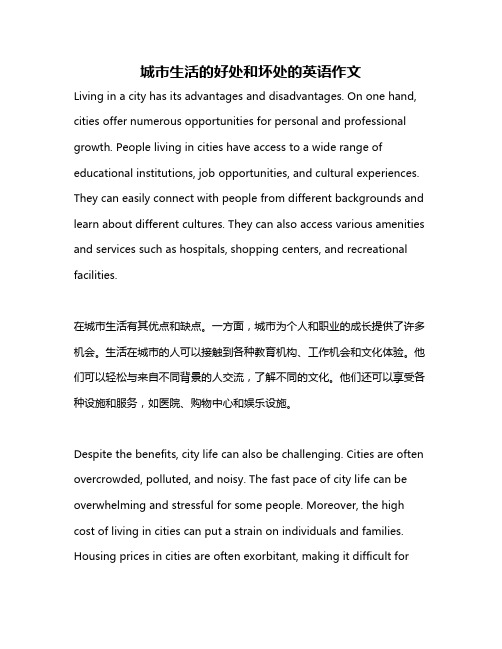
城市生活的好处和坏处的英语作文Living in a city has its advantages and disadvantages. On one hand, cities offer numerous opportunities for personal and professional growth. People living in cities have access to a wide range of educational institutions, job opportunities, and cultural experiences. They can easily connect with people from different backgrounds and learn about different cultures. They can also access various amenities and services such as hospitals, shopping centers, and recreational facilities.在城市生活有其优点和缺点。
一方面,城市为个人和职业的成长提供了许多机会。
生活在城市的人可以接触到各种教育机构、工作机会和文化体验。
他们可以轻松与来自不同背景的人交流,了解不同的文化。
他们还可以享受各种设施和服务,如医院、购物中心和娱乐设施。
Despite the benefits, city life can also be challenging. Cities are often overcrowded, polluted, and noisy. The fast pace of city life can be overwhelming and stressful for some people. Moreover, the high cost of living in cities can put a strain on individuals and families. Housing prices in cities are often exorbitant, making it difficult formany people to afford decent housing. Traffic congestion and long commutes can also eat into valuable time that could be spent with loved ones or pursuing personal interests.尽管有这些好处,城市生活也会带来挑战。
城市生活的好处和坏处的英语作文
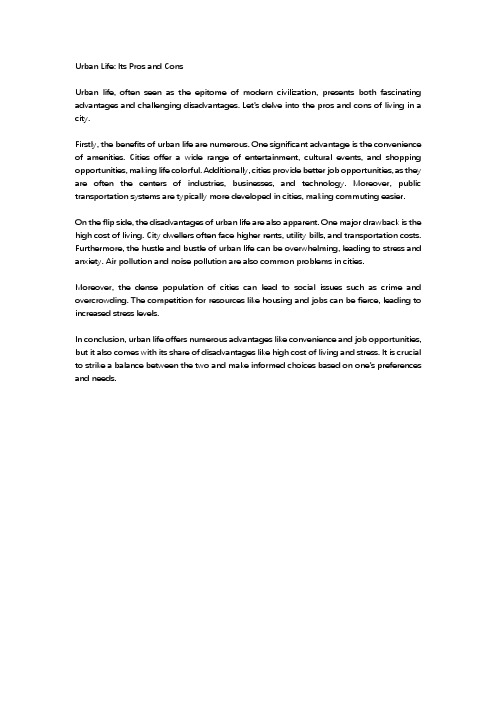
Urban Life: Its Pros and ConsUrban life, often seen as the epitome of modern civilization, presents both fascinating advantages and challenging disadvantages. Let's delve into the pros and cons of living in a city.Firstly, the benefits of urban life are numerous. One significant advantage is the convenience of amenities. Cities offer a wide range of entertainment, cultural events, and shopping opportunities, making life colorful. Additionally, cities provide better job opportunities, as they are often the centers of industries, businesses, and technology. Moreover, public transportation systems are typically more developed in cities, making commuting easier.On the flip side, the disadvantages of urban life are also apparent. One major drawback is the high cost of living. City dwellers often face higher rents, utility bills, and transportation costs. Furthermore, the hustle and bustle of urban life can be overwhelming, leading to stress and anxiety. Air pollution and noise pollution are also common problems in cities.Moreover, the dense population of cities can lead to social issues such as crime and overcrowding. The competition for resources like housing and jobs can be fierce, leading to increased stress levels.In conclusion, urban life offers numerous advantages like convenience and job opportunities, but it also comes with its share of disadvantages like high cost of living and stress. It is crucial to strike a balance between the two and make informed choices based on one's preferences and needs.。
在大城市生活的优点和缺点英语作文
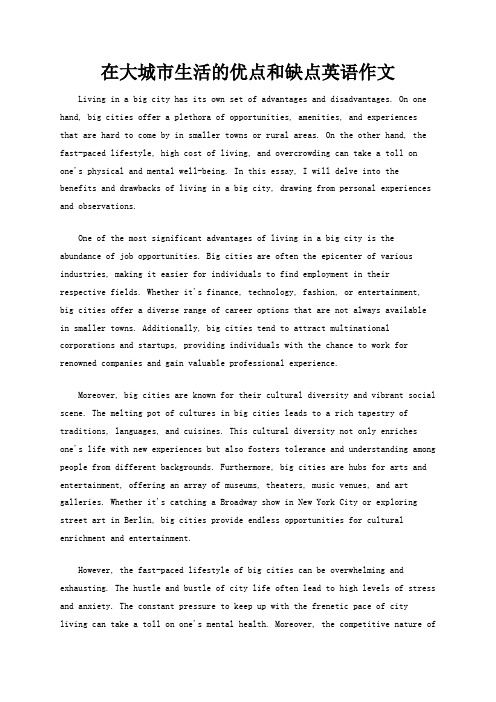
在大城市生活的优点和缺点英语作文Living in a big city has its own set of advantages and disadvantages. On one hand, big cities offer a plethora of opportunities, amenities, and experiencesthat are hard to come by in smaller towns or rural areas. On the other hand, the fast-paced lifestyle, high cost of living, and overcrowding can take a toll onone's physical and mental well-being. In this essay, I will delve into thebenefits and drawbacks of living in a big city, drawing from personal experiences and observations.One of the most significant advantages of living in a big city is the abundance of job opportunities. Big cities are often the epicenter of various industries, making it easier for individuals to find employment in their respective fields. Whether it's finance, technology, fashion, or entertainment, big cities offer a diverse range of career options that are not always available in smaller towns. Additionally, big cities tend to attract multinational corporations and startups, providing individuals with the chance to work for renowned companies and gain valuable professional experience.Moreover, big cities are known for their cultural diversity and vibrant social scene. The melting pot of cultures in big cities leads to a rich tapestry of traditions, languages, and cuisines. This cultural diversity not only enrichesone's life with new experiences but also fosters tolerance and understanding among people from different backgrounds. Furthermore, big cities are hubs for arts and entertainment, offering an array of museums, theaters, music venues, and art galleries. Whether it's catching a Broadway show in New York City or exploring street art in Berlin, big cities provide endless opportunities for cultural enrichment and entertainment.However, the fast-paced lifestyle of big cities can be overwhelming and exhausting. The hustle and bustle of city life often lead to high levels of stress and anxiety. The constant pressure to keep up with the frenetic pace of cityliving can take a toll on one's mental health. Moreover, the competitive nature ofbig cities can breed a sense of isolation and detachment, making it challenging to form genuine connections with others. The anonymity of city life can lead to feelings of loneliness and alienation, especially for those who are new to thecity or have a small social circle.Another downside of living in a big city is the exorbitant cost of living. From steep rents to inflated prices for everyday necessities, big cities can be financially burdensome. Affordable housing is often scarce, forcing many residents to live in cramped quarters or endure long commutes from more affordable areas. The high cost of living also extends to healthcare, transportation, and childcare, making it difficult for individuals and families to make ends meet. As a result, many people in big cities struggle to achieve financial stability and may face hardships in saving for the future.Furthermore, the overcrowding and congestion in big cities can be a major source of frustration. Traffic jams, packed public transportation, and long lines are commonplace in big cities, leading to a significant amount of time wasted on commuting and running errands. The sheer volume of people in big cities can also lead to noise pollution and a lack of personal space. Finding moments of peace and solitude in a city teeming with activity and noise can be a challenge, impacting one's overall quality of life.In conclusion, living in a big city comes with a multitude of advantages and disadvantages. While big cities offer unparalleled opportunities for career advancement, cultural enrichment, and social experiences, they also present challenges such as stress, high living costs, and overcrowding. Ultimately, whether the benefits of big city living outweigh the drawbacks depends on individual preferences and priorities. As someone who has experienced both the allure and the drawbacks of big city living, I can attest to the complex nature of this lifestyle. While big cities have much to offer, they also demand a great deal in return.。
城市生活和乡村生活的优缺点作文

城市生活和乡村生活的优缺点作文全文共6篇示例,供读者参考篇1标题:城市生活和乡村生活的优缺点大家好,我是小明。
今天我要和大家分享一下关于城市生活和乡村生活的优缺点。
首先,让我们来看看城市生活的优点吧!城市里有很多好玩的地方,比如游乐园、电影院、博物馆等等。
我最喜欢去游乐园了,那里有很多刺激的游乐设施,我和朋友们可以尽情玩耍。
电影院里不仅可以看最新的电影,还有美味的爆米花。
博物馆里藏着各种各样有趣的展品,去那里我们可以学到很多知识。
城市里也有许多好吃的餐馆,有中餐、西餐、快餐等,种类可真多。
我最爱吃披萨和汉堡了!妈妈不用亲自下厨,我们一家人就可以尽情品尝各种美食。
除此之外,城市里有很多学校,教育资源很丰富,我们可以接受良好的教育。
医院也很先进,生病的时候能ไไ到很好的医疗服务。
当然,城市生活也有一些缺点。
城市里的空气质量不太好,到处是车辆和工厂排放的废气。
交通也很拥挤,上下班的时候经常会堵车。
城市里的房价又高又贵,普通家庭很难在市中心买房。
噪音也是一大问题,汽车鸣笛声、施工声、人声嘈杂,实在太吵了!城市生活节奏太快,人们总是忙忙碌碌的,压力很大。
相比之下,乡村生活就要悠闲自在多了。
乡村的空气干净清新,到处是绿树成荫。
天空中有蓝蓝的天和白白的云,小鸟在枝头欢快地啼叫。
溪水潺潺流过,泉水叮咚作响,这都是大自然的天籁之音啊!在乡下,我们可以采摘新鲜的果蔬,吃最纯正的农家菜。
妈妈做的家常菜可美味了,比餐馆的好吃多了。
乡村的房子也很便宜,家家户户都有自己的大房子和庭院。
生活在乡村,我们可以尽情地玩耍。
田野就是我们的游乐场,稻草垛就是我们的滑梯。
夏天,我们可以下河游泳;冬天,我们可以堆雪人打雪仗。
无拘无束,多自由自在啊!不过,乡村生活也有一些不足之处。
乡村的教育和医疗条件都比较落后。
学校老师不太专业,医院的设备也比较陈旧。
乡村的交通不太方便,去远一点的地方得走很久。
再说,乡下也没有那么多商场和娱乐设施,日常生活中缺少一些便利。
城市化的利与弊作文
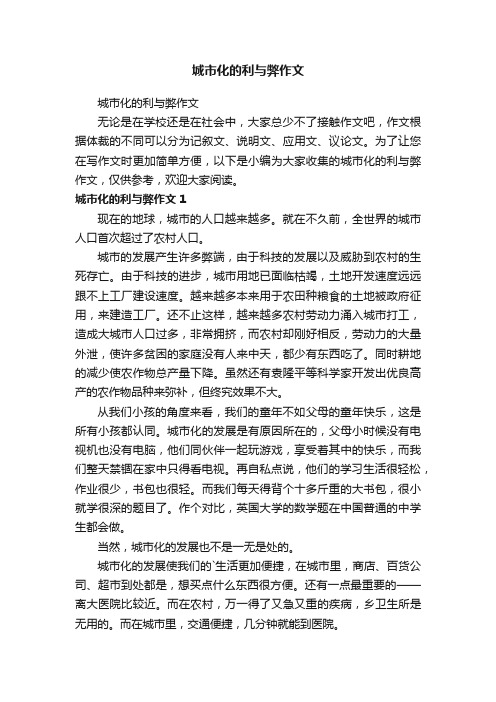
城市化的利与弊作文城市化的利与弊作文无论是在学校还是在社会中,大家总少不了接触作文吧,作文根据体裁的不同可以分为记叙文、说明文、应用文、议论文。
为了让您在写作文时更加简单方便,以下是小编为大家收集的城市化的利与弊作文,仅供参考,欢迎大家阅读。
城市化的利与弊作文1现在的地球,城市的人口越来越多。
就在不久前,全世界的城市人口首次超过了农村人口。
城市的发展产生许多弊端,由于科技的发展以及威胁到农村的生死存亡。
由于科技的进步,城市用地已面临枯竭,土地开发速度远远跟不上工厂建设速度。
越来越多本来用于农田种粮食的土地被政府征用,来建造工厂。
还不止这样,越来越多农村劳动力涌入城市打工,造成大城市人口过多,非常拥挤,而农村却刚好相反,劳动力的大量外泄,使许多贫困的家庭没有人来中天,都少有东西吃了。
同时耕地的减少使农作物总产量下降。
虽然还有袁隆平等科学家开发出优良高产的农作物品种来弥补,但终究效果不大。
从我们小孩的角度来看,我们的童年不如父母的童年快乐,这是所有小孩都认同。
城市化的发展是有原因所在的,父母小时候没有电视机也没有电脑,他们同伙伴一起玩游戏,享受着其中的快乐,而我们整天禁锢在家中只得看电视。
再自私点说,他们的学习生活很轻松,作业很少,书包也很轻。
而我们每天得背个十多斤重的大书包,很小就学很深的题目了。
作个对比,英国大学的数学题在中国普通的中学生都会做。
当然,城市化的发展也不是一无是处的。
城市化的发展使我们的`生活更加便捷,在城市里,商店、百货公司、超市到处都是,想买点什么东西很方便。
还有一点最重要的——离大医院比较近。
而在农村,万一得了又急又重的疾病,乡卫生所是无用的。
而在城市里,交通便捷,几分钟就能到医院。
城市的发展,有利也有弊,我们应该增大益处而减少害处,这样就能维护城市和农村的平衡发展。
城市化的利与弊作文2现在的科技越来越发达,许多乡村变成了都市,人们的生活也越来越富裕了,电脑,手机,火车等等,都都给人民的生活带来了方便,与此同时也出现了许多问题,人民变得懒惰,城市出现暖冬现象等。
在大城市生活的好处与坏处英语作文
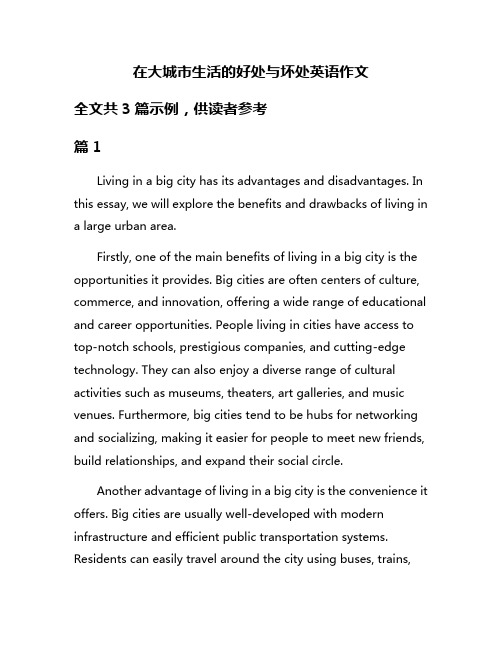
在大城市生活的好处与坏处英语作文全文共3篇示例,供读者参考篇1Living in a big city has its advantages and disadvantages. In this essay, we will explore the benefits and drawbacks of living in a large urban area.Firstly, one of the main benefits of living in a big city is the opportunities it provides. Big cities are often centers of culture, commerce, and innovation, offering a wide range of educational and career opportunities. People living in cities have access to top-notch schools, prestigious companies, and cutting-edge technology. They can also enjoy a diverse range of cultural activities such as museums, theaters, art galleries, and music venues. Furthermore, big cities tend to be hubs for networking and socializing, making it easier for people to meet new friends, build relationships, and expand their social circle.Another advantage of living in a big city is the convenience it offers. Big cities are usually well-developed with modern infrastructure and efficient public transportation systems. Residents can easily travel around the city using buses, trains,subways, or taxis. In addition, cities are home to a wide variety of amenities such as shopping malls, restaurants, gyms, parks, and healthcare facilities, making it easy for people to find everything they need within close proximity.Moreover, big cities tend to be melting pots of different cultures and ethnicities, creating a diverse and vibrant community. People living in cities have the opportunity to interact with individuals from different backgrounds, learn about different customs and traditions, and broaden their perspectives. This cultural diversity can enrich people's lives and enhance their understanding of the world.However, living in a big city also has its downsides. One of the main drawbacks is the high cost of living. Cities are often more expensive than rural areas in terms of housing, utilities, groceries, transportation, and entertainment. Rent prices can be sky-high, making it difficult for people to afford a decent living space. In addition, congestion and traffic jams are common issues in big cities, leading to long commutes, pollution, and stress.Furthermore, big cities can be overwhelming and impersonal. The fast-paced lifestyle, the hustle and bustle of the city, and the constant noise and pollution can take a toll on people's mentaland physical health. Residents may feel isolated, disconnected, and anxious in such a hectic environment. The high population density in cities can also lead to overcrowding, competition, and crime rates.In conclusion, living in a big city has both advantages and disadvantages. While big cities offer plenty of opportunities, conveniences, and cultural experiences, they also come with high costs, congestion, and stress. Ultimately, the decision to live in a big city depends on individual preferences and priorities. Some people may thrive in the dynamic and diverse urban environment, while others may prefer the tranquility and simplicity of rural life.篇2Living in a big city has its own advantages and disadvantages. In this essay, we will explore the benefits and drawbacks of living in a large metropolitan area.Firstly, one of the major benefits of living in a big city is the plethora of job opportunities available. Big cities are home to numerous companies, organizations, and industries, providing a wide range of job options for residents. This can lead to better career prospects, higher salaries, and more chances for careeradvancement. Additionally, big cities often attract top talent from around the world, creating a diverse and competitive job market.Secondly, big cities offer a wide range of entertainment options. From theaters and museums to restaurants and shopping centers, there is always something to do and see in a big city. Residents can enjoy a vibrant cultural scene, attend concerts and events, and explore different cuisines from around the world. Big cities also tend to have better public transportation systems, making it easier for residents to get around and access these entertainment possibilities.Furthermore, living in a big city can provide a higher quality of education and healthcare. Big cities are typically home to top universities, research institutions, and medical facilities, offering residents access to world-class education and healthcare services. This can lead to better educational opportunities for children and better healthcare outcomes for residents.However, living in a big city also has its drawbacks. One of the main disadvantages is the high cost of living. Big cities tend to have higher housing prices, higher taxes, and higher overall expenses compared to smaller towns and rural areas. This canmake it challenging for some residents to afford basic necessities and maintain a high standard of living.Another downside of living in a big city is the overcrowding and congestion. Big cities are often densely populated, leading to traffic jams, long commutes, and crowded public spaces. This can result in increased stress, pollution, and noise levels, impacting residents' quality of life and overall well-being.In conclusion, living in a big city has its pros and cons. While big cities offer numerous job opportunities, entertainment options, and access to quality education and healthcare, they also come with a high cost of living and challenges related to overcrowding and congestion. Ultimately, whether living in a big city is beneficial or not depends on individual preferences and circumstances.篇3Living in a big city has its benefits and drawbacks. In this essay, we will explore the advantages and disadvantages of living in a large urban area.One of the main advantages of living in a big city is the abundance of opportunities. Cities are often hubs of commerce, culture, and innovation, providing residents with a wide range ofcareer options and cultural experiences. In addition, cities tend to attract a diverse population, allowing individuals to interact with people from different backgrounds and learn about new perspectives.Another advantage of city living is the convenience. Cities typically have a well-developed infrastructure, including public transportation systems, hospitals, schools, and recreational facilities. This makes it easy for residents to access essential services and amenities without having to travel far. In addition, cities are often home to a variety of dining, entertainment, and shopping options, providing residents with a wealth of choices for leisure activities.On the other hand, living in a big city also comes with its challenges. One of the main drawbacks is the high cost of living. Rent, food, transportation, and other expenses are typically higher in cities compared to rural areas, making it more difficult for some people to afford a comfortable standard of living. In addition, the fast pace of city life can be stressful and overwhelming, leading to feelings of burnout and anxiety.Another downside of city living is the lack of space. In crowded urban areas, housing tends to be more compact and expensive, with limited green spaces and outdoor areas. This canmake it challenging for residents to find a peaceful retreat from the hustle and bustle of city life. In addition, traffic congestion and pollution are common problems in big cities, impacting residents' quality of life and overall health.In conclusion, living in a big city has both advantages and disadvantages. While cities offer a wealth of opportunities and conveniences, they can also be expensive, stressful, and crowded. Ultimately, the decision to live in a city or not depends on individual preferences and priorities. It is important for residents to weigh the pros and cons carefully before choosing where to live.。
- 1、下载文档前请自行甄别文档内容的完整性,平台不提供额外的编辑、内容补充、找答案等附加服务。
- 2、"仅部分预览"的文档,不可在线预览部分如存在完整性等问题,可反馈申请退款(可完整预览的文档不适用该条件!)。
- 3、如文档侵犯您的权益,请联系客服反馈,我们会尽快为您处理(人工客服工作时间:9:00-18:30)。
——文章来源网,仅供分享学习参考
1 关于城市生活的利弊作文
关于城市生活的利与弊(City life advantage and shortcoming)
温馨提示:这是一篇描写大城市生活的利与弊的英语作文范文,住在大城市里有利也有弊,有些人觉得利大于弊,有些人的观点正好相反,你是怎么认为的呢?
living in a city has both advantages and disadvantages. it is often easier to find work. there are always many choices of public transport. besides, there are a lot of interesting things to do and places to see. you can eat in good restaurants, visit museums, go to cinemas and go to parks whenever you want to relax. however, living in a city is often very expensive. you must find a well-paid job, otherwise, you will not be able to afford the things you will do. what's more, the city is always crowded, noisy and dirty. it is very difficult to find a good place where people can enjoy peace and fresh air as in the countryside.对应翻译: 生活在城市里既有优点也有缺点,优点是它通常更容易找到工作,有很多交通方式进行选择。
此外,还有可以看到很多有趣的事物,还有你可以在好的餐馆吃饭,去参观博物馆,去电影院看电影,当你想放松时可以去公园。
然而,生活在一个城市里花费是非常昂贵的。
你必须找到一个高薪的工作,否则,你将无法负担你的花销。
更重要的是,这个城市很拥挤,嘈杂和肮脏。
这是很难找到一个好地方,人们可以享受和平和乡间的新鲜空气。
